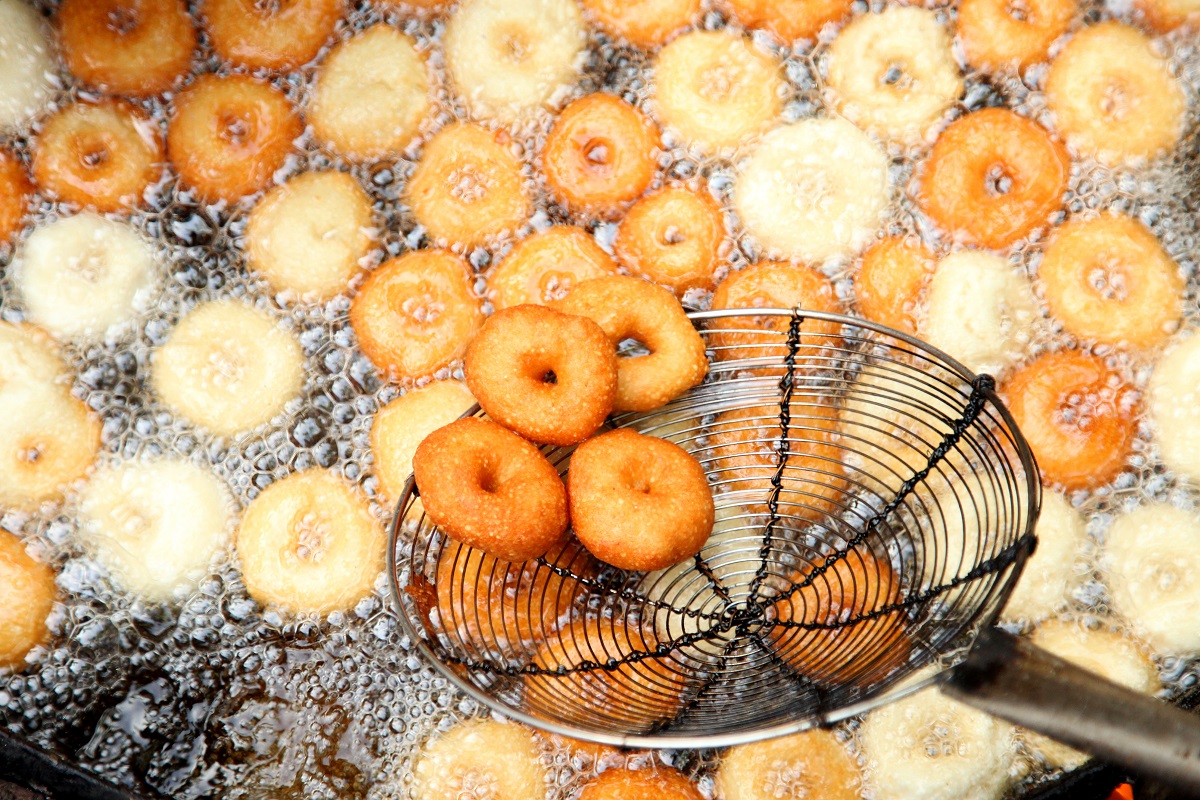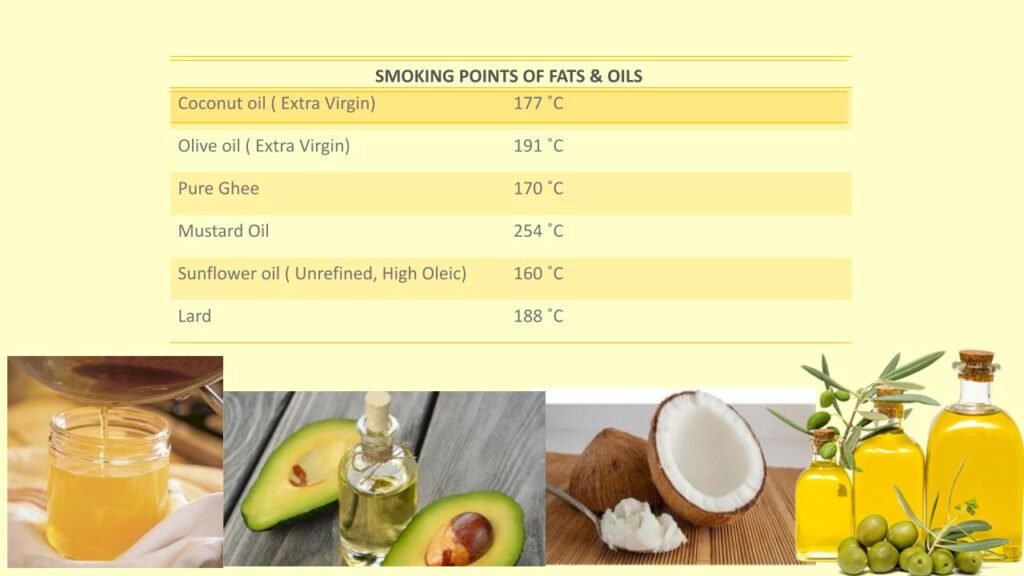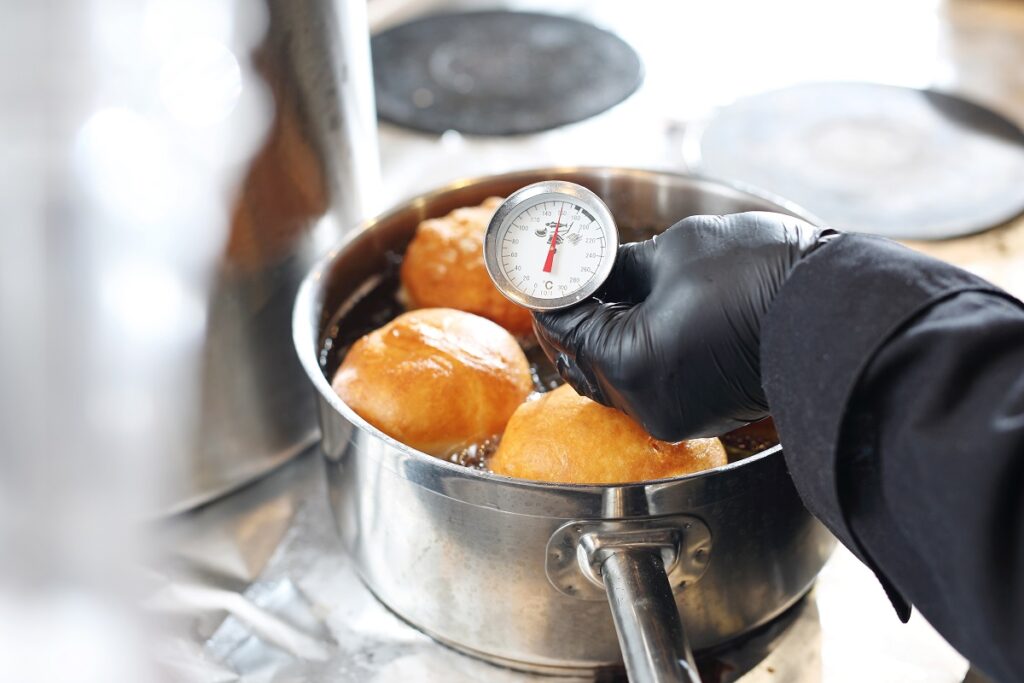What really matters is the oil you use and how you fry your food, writes Deepa Desa
In India we love our fried foods. Whether at home (think of crispy hot pakora curry, French fries and burgers, hot sauce with momos, etc.), or on our streets – it’s a fried party – from bhel puri walas, bhajia walas, samosas, vada pao, medhu vada, bread pakoras, jalebis, bhaturas with chole; you name it, and all our cities serve up deep fried foods that are lip- smacking delicious – and well…deep fried!
Fried foods are rarely associated with “healthy” foods. The truth about deep fried foods is that they do result in health issues like cholesterol, heart disease and diabetes type 2, not to mention the adverse effect on your liver. They remain, however, among the most popular foods, not only in India, but globally as well.
But read on, to learn whether deep frying food is all that bad…
Interestingly, recent reports indicate that deep frying may not be the big demon we make it out to be. What really matters is the oil you use and how you fry your food.
Another big caveat is that fried food is far healthier at home – since you are in control of the quality and re- use of oil; plus, you can monitor the entire process. On the street and in most restaurants… sadly, we all know what happens (or perhaps we rather not know!), so you can be the best judge of how regular eating of fried foods from outside may affect your health in the long run.
What exactly does deep frying entail?
The basic frying process is not as simple as it looks. It involves simultaneous complex and dynamic events.
The frying process relies on high temperatures and can changes the structure of nutrients, such as proteins, vitamins, and antioxidants. Some water-soluble molecules, such as ascorbic acid can be lost during the water evaporation that occurs during deep frying.
Heating cooking oil to a higher temperature than its smoke point causes degradation that can produce toxic fumes and harmful free radicals. Some of these by-products can have adverse effects on our health.
Which oil is right for you?
There are a few considerations before you zoom in on your choice of the best deep- frying oil:
1. The Smoke Point
One of the most important considerations when selecting the best oil for frying is how it will react to high heat. The temperature at which oil begins to break down into free fatty acids and visibly produce smoke is its smoke point. It is essential to know and pay attention to an oil’s smoke point because using an oil beyond its smoke point is quite lethal.
Burned oil does more than give your food an unpleasant flavour, it also destroys phytochemicals and beneficial nutrients in both the oil and the food, creates highly flammable conditions and releases free radicals that can be harmful to your health.
2. Refined or Unrefined Oil? It Affects Oxidative Stability
Several processes are used to extract oil from plants, seeds, and nuts. This can be done through the use of pressure, such as cold-pressing, or mechanical, thermal or chemical processes. Some manufacturers refine the oil to ensure purity and clarity, decrease rancidity for longer storage and make their products more resistant to smoking.
Refined oils are a strict no-no, according to one study. After refining, oils are then heated repeatedly at high temperatures of up to 270°C for deodorization. These high temperatures result in oxidative instability – loss of antioxidants and produce all free radicals and trans-fat, both of which are harmful for the body.
The refining process affects not just the flavour but also decreases the levels of polyphenols, which help protect your cells from oxidative damage.
Processing (the adding of solvents to oils), may also reduce the micronutrients in oil as well as its antioxidant activity and create lipid degradation. This will ultimately affect the potential health benefits of the oil.
Most oils you find on supermarket shelves are refined, although many are also available unrefined, albeit often expensive.
3. MUFA, PUFA, Trans- Fat, Saturated Fats in Oils
Dr Helen Delichatsios, an internist at Harvard-affiliated Massachusetts General Hospital is of the opinion that the process of frying food is not as unhealthy as the type of fat that is used. “Unsaturated fat is best. Saturated fat should be minimized, and trans – fat should not be consumed,” she says.
Diets higher in saturated fat can increase the risk of developing cardiovascular disease. Saturated fat can raise the levels of total cholesterol and low-density lipoprotein (LDL or “bad”) cholesterol in the blood.
Some of the saturated fats we should not fry food in are tallow and suet, butter, chicken fat, pork fat (lard), shortening, and palm oil, and palm kernel oil. These are all highly saturated cooking fats.
In general, the lower the amount of saturated fat and the higher the content of unsaturated fat, the healthier the oil is.
Trans fats form when vegetable oils are hydrogenated into vanaspati and stick margarine. This results in partially hydrogenated oil, which can negatively affect your health and increase the risk of heart disease, according to a study published in the July-August 2016 issue of Indian Heart Journal.
As you’ve read there’s much more to consider when deep frying than we thought. Additionally, in India we tend to use one oil – to cook, sauté, deep fry, as a salad dressing and much more.
With the information we have at hand, it now makes more sense to choose consciously – the oils we choose to deep fry, to cook with, to make dressings and mayonnaise etc. should fit the requirement of their function.
The Best Oils for Frying
Some of the best oils for frying have a high smoke point, contain healthy monounsaturated fats and are low in saturated fats.
Olive Oil
Olive oil has anti-inflammatory properties and is high in antioxidants and essential fatty acids (EFA’s). This makes it a more stable oil when heated at high temperatures. This stated, it is still recommended that olive oil is used more for shallow frying than deep frying.
Coconut Oil
Depending on who you ask, coconut oil should either be avoided or embraced in moderation. The main point of conflict is its high saturated fat content; unlike other plant-based oils, coconut oil is primarily a saturated fat.
That doesn’t mean it should be banned from your kitchen. In fact, saturated fats can be a healthier oil to use when you’re deep frying because they are more stable at high heat. This means that they are less likely to break down and smoke.
Coconut oil is also stable for shallow frying.
Sunflower Oil
This oil is high in vitamin E which gives it oxidative stability during the deep – frying process It has a high smoke point and doesn’t have a strong flavor, which means it won’t overwhelm a dish.
However, sunflower oil contains a lot of omega-6 fatty acids. The body needs them, but omega-6s are thought to be pro-inflammatory, while omega-3s are anti- inflammatory.
Consuming too many omega-6s without balancing with omega 3s, could lead to an excess inflammation in the body, so moderation is key.
Mustard Oil
This oil is often used for its potent flavour; a little goes a long way. It contains both monounsaturated and polyunsaturated fatty acids. It has a higher smoke point and can be used for high-heat recipes.
Avocado Oil
Along with coconut oil and olive oil, avocado oil is a good oil to use for shallow frying. Avocado oil contains high levels of monounsaturated fat, which means that it stays fairly stable when heated.
Avocado oil raises the levels of good cholesterol in the body and lowers the bad. It also contains Vitamin E, an antioxidant that may help reduce free radicals in the body.
Ghee
A study found that desi ghee is enriched with CLA, (an essential fatty acid) vitamin-A and small quantities of vitamin D, E and K.
Heating of desi ghee from 140–150°C does not affect its natural molecular composition and this temperature range can be used for household cooking/frying purposes. However, up to temperature of 170°C, ghee can be used for cooking/frying with less deterioration of valuable ingredients. Above temperature of 180°C, it deteriorates more and more and becomes rancid at 250°C.
Ghee also has a high smoke point, so it’s an excellent choice for deep-frying and stir-frying.
Cow’s ghee is full of nutritive qualities. Pure ghee contains only those fatty acids or saturated fats that are primarily (89%) short-chain fatty acids. Lab studies have shown pure ghee to reduce cholesterol.
How to Deep Fry:
- Use a large, wide, sturdy pan.Never fill the pan more than two-thirds full of oil as it may bubble up when food is added and could spill over.
- Check the temperature of your oil.If you have a food thermometer heat the oil to 160˚C for low, 180˚C for moderate and 190˚C for high. Avoid heating the oil any higher than this. These temperatures are perfect for creating a crust on your food as soon as it hits the pan According to experts, this process seals the outsides, prevents the food from absorbing too much oil.
- Never put wet food in the fryer. Excess liquid will cause the oil to splutter which can cause serious injuries. Particularly wet foods should be patted dry with kitchen paper before frying.
- Don’t leave the deep- frying process unattended. The oil can overheat and catch fire, your food can burn.
- Remove food with a large, slotted spoon or sturdy tongs, something that allows the oil to drain as you lift the food out. You can drain the excess oil on a kitchen paper towel or on the big, slotted spoon itself.
Note: Avoid heating oils at or above 375°F (190.5°C), as this can increase the chances of a toxic (aldehyde) compound called 4-hydroxy-2-trans-nonenal (HNE) building up. HNE can increase the risk of health conditions such as liver disease, Parkinson’s disease, and stroke.
HNE can start to build up after just one use and reheating the same oil to a high temperature can cause HNE to accumulate even further.
Oils That You Should Not Use for Deep Frying
Though most professional chefs love to deep fry in lard and most commercial deep – fried foods are fried in partially hydrogenated oils, these oils and fats contain large amounts of trans fats.
Trans fats increase LDL, or “bad,” cholesterol in the body and increase inflammation. This can increase the risk of heart disease, stroke and diabetes.
- Avoid using butter, all types of lard and palm oil.
- Vegetable-oil-based ghee (vanaspati). Vanaspati is partially hydrogenated vegetable oil, widely used commercially. Vanaspati has a high amount of trans-fats, (longer-chain fatty acids), that are associated with blood clotting and thrombosis.
- While Extra Virgin Olive Oil and Flaxseed Oil are fantastic for your diet, they shouldn’t be used for deep frying. These oils oxidize and form free radicals at high temperatures so are best served at much cooler temperatures (cold for flaxseed).
- You may also want to avoid oils dominant in “processed” polyunsaturated fats and high ratios of Omega-6 fatty acids. Most modern diets contain oils such as processed sunflower oil, soybean oil, and corn oil, these oils more often than not are processed polyunsaturated fats and have far too high a ratio of Omega-6 fatty acids to Omega-3s. This leads to inflammation in the body.
In Conclusion
According to the experts, the best oils to deep fry foods are olive oil, coconut oil, non-refined mustard oil, non-refined canola oil, ghee.
“The important thing to remember is that repeated heating of the same oil must be avoided. It just exaggerates the harmful effects,” said Dr Manchanda, quoting an Indian study, which found high levels of trans – fat in samples of oil collected from halwais who used the same oil for repeated frying.
Blending of oils combines the potency of two/more edible oils, offers a balance of fatty acids and antioxidants, and this approach is used to enhance the oxidative and thermal stability of oils.
In fact, epidemiologic studies among Indians do suggest that mustard oil consumption can reduce the risk of Coronary Heart Disease (CHD).
Further, appropriate blending of edible oils (such as rice bran and safflower oil; coconut and sesame oil; canola and flaxseed oil at a 70:30 ration) also appears to be a good option to reduce the plasma lipids, inflammation and, thus, the Coronary Heart Disease risk.
Finally, experiments have shown that food absorption of oil is lesser in deep frying than shallow frying. Since shallow frying takes more time to cook, the food remains in oil for a longer time. And hence, the absorption of oil is more. You will notice the food to be greasy.
On the other hand, deep fried items will have very little oil on them, if the proper technique is used. If the temperature of the oil is correct, and maintained throughout the frying process, the food gets cooked evenly. And here, only the surface of the food meets the oil.
Try it out yourself! And stay healthy!
References:
https://www.ncbi.nlm.nih.gov/pmc/articles/PMC4990724/
https://www.ncbi.nlm.nih.gov/pmc/articles/PMC5947909/
https://www.health.harvard.edu/staying-healthy/healthier-oils-make-fried-food-safer






